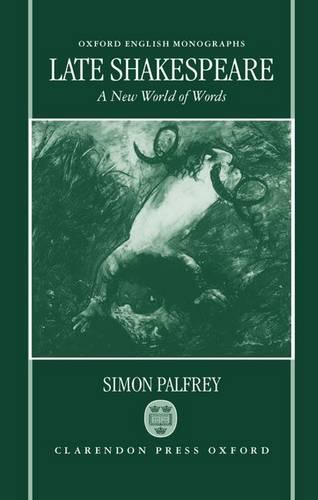Overview
Shakespeare's late plays are usually seen in terms of courtliness and escapism. But the critical tradition has been too decorous. Neither neo-Christian pieties nor high-political allegory can account for the works' audacity and surprise, or the popular investment in both their form and meaning. Post-structuralist and historicist approaches show the indeterminacy and materiality of language, but rarely identify how particular figures (words and characters) capture and energise contested history. Recent criticism tends to put a pre-emptive `master-paradigm' above all else; a more sinuous, minutely attentive critical vocabulary is needed to apprehend Shakespeare's turbulent, precise, teeming metaphorical discourse. Late Shakespeare: A New World of Words reappraises the origins of authority, language, and decorum, and the prospects for each. Through his portrayal of `popular' desire---in his rustics, clowns, rogues, slaves, women---Shakespeare presents worlds which explore the meaning of the `subject', and the potential for effective transformatory agency. Rather than a Jonsonian (or perhaps earlier Shakespearian) verisimilitude, with each person discrete and verifiable, Shakespeare's characters embody metaphor-in-process; like the revamped romance genre itself, they `take on' surrounding turbulence. The plays show the stormy consequences of hegemonic violence. The subsequent exile to wilderness allows for contingent novelty: new liberties are tested amid the wreckage or recapitulation of old forms. The plays pit possible sources of regeneration (romantic pastoral, semi-populist humanism) against more primal violence and rebelliousness. Finally, the book argues against a conventional sense of the plays' movement towards divinely sanctioned closure; mischief, irony, polysemy remain; romance's political problems are competitive, multiple, and tumescently unpredictable.
Full Product Details
Author: Simon Palfrey (Lecturer in English, Lecturer in English, University of Liverpool)
Publisher: Oxford University Press
Imprint: Clarendon Press
Dimensions:
Width: 14.40cm
, Height: 2.30cm
, Length: 22.50cm
Weight: 0.511kg
ISBN: 9780198186199
ISBN 10: 0198186193
Pages: 312
Publication Date: 21 August 1997
Audience:
Professional and scholarly
,
Professional & Vocational
Format: Hardback
Publisher's Status: Active
Availability: To order

Stock availability from the supplier is unknown. We will order it for you and ship this item to you once it is received by us.
Reviews
Among the most significant books of the year....With every phrase, sentence, paragraph, the writer conveys a mysterious grasp of an aesthetics beyond the power of word to express....Indispensable for its subject. --Studies in English Literature<br> Palfrey's nuanced, historically and theoretically informed reading presents Shakespeare's romances as complex, multivocal, open-ended reflections of their troubled political times....Succeeds unequivocally in offering a powerful corrective to the prevailing reading of Shakespeare's romances. --Sixteenth Century Journal<br> Presents valuable insights into the undercurrent of turbulence and discord that informs these romantic plays. --Choice<br>
Among the most significant books of the year....With every phrase, sentence, paragraph, the writer conveys a mysterious grasp of an aesthetics beyond the power of word to express....Indispensable for its subject. --Studies in English Literature Palfrey's nuanced, historically and theoretically informed reading presents Shakespeare's romances as complex, multivocal, open-ended reflections of their troubled political times....Succeeds unequivocally in offering a powerful corrective to the prevailing reading of Shakespeare's romances. --Sixteenth Century Journal Presents valuable insights into the undercurrent of turbulence and discord that informs these romantic plays. --Choice
Author Information
Simon Palfrey is Lecturer in English and the History of Ideas at the University of Melbourne.




